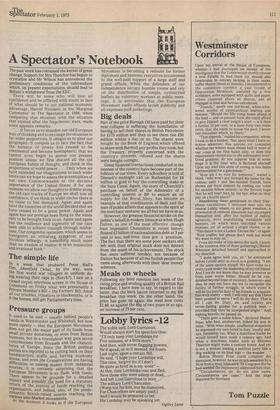Westminster Corridors
Upon my arrival at the House of Commons, whither I had journeyed on receipt of the intelligence that the Tories would shortly choose a new Paladin to lead them (or, should able Leadership be entirely lacking in their ranks, suffer Master Heath to remain), I encountered in the committee corridor a vast crowd of Opposition Members, assisted by a few scribblers, some equipped with quills and paper, others clustered above an abacus, and all engaged in loud and furious calculation.
"Zounds," quoth one red-faced, white-whiskered worthy of squirearchical bearing and manner, "Should the filly romp home ahead of the field — and on present form she could afford to give Disraeli a clear length's start — is it then a further 15 per cent, or a mere forty-two votes extra, that she needs to scoop the pool. I never can remember which, by Harry."
"That depends," replied his companion, whom I took to be a banker, "but upon what I have no notion whatever. Has anyone yet computed whether the winner must obtain half or more of our votes at the first ballot only, or does this requirement extend also to the subsequent tests? Good gracious, do you suppose that at some stage it is the loser who is declared elected? Upon my soul this style of voting is too damn mathematical for a gentleman."
"How am I to vote for someone," wailed a third, "who won't put forward his name for the contest until I and like-minded friends have shown our loyal support by casting our votes for another fellow entirely, in the fervent hope that he will lose? And, by the bye, what do they pay on a fourth place?"
Abandoning these gentlemen to their Sisyphean calculations, I ventured next into the central Lobby where, to my great vexation, a procession of eminent placemen had encamped themselves and, after the fashion of radical agitators, were brandishing standards and banners, on which were inscribed various mottoes, yet all around a single theme, — as "This dance is not a Ladies' Excuse Me", or again "Rule cradles, but please don't rock our world. We want to stay on."
From the midst of this demo (for such, I learn, is the common title of these gatherings) Master Whitelaw detached himself and approached in my direction.
"I quite agree with you, sir," he announced before I could utter so much as a greeting. "I am of the same opinion myself. We have come to a pretty pass under the leadership of my old friend. And I yet do not know that he may preserve us from even worse follies. Should he be vanquished beyond hope of recovery, however—and alas, he may not have the wit to recognise the futility of further struggle, in which event it will be the painful duty of his friends to acquaint him with reality — well, I will only say that I have been pressed to serve I will do my duty. That is all I can do. Duty, sir, and loyalty are never-failing guides for a publick man — provided that they be interpreted aright." And, sighing heavily, he passed on.
"There goes a noble fellow," declared Master Prior, who had, unobserved, linked his arm in mine. "With what simple, unaffected eloquence he expressed my own helief in duty, Loyalty and, aye, friendship too. What a matchless leader he would himself have made a century ago. And what a matchless leader such as Mistress Thatcher might make a century hence. And yet is not a woman leading a political party like a dog walking on its hind legs — the wonder. .."
Before Master Prior could complete the quotation, however, he was struck-senseless by a blow from a stoullrish-stick:Dr Cosgrave (for he _bad-wietded tEe implement) addressed him thus: "Circumstances, sir, do not alter cases. Circumstances are cases." And the Sage departed for Scotland.
Tom Puzzle


































 Previous page
Previous page